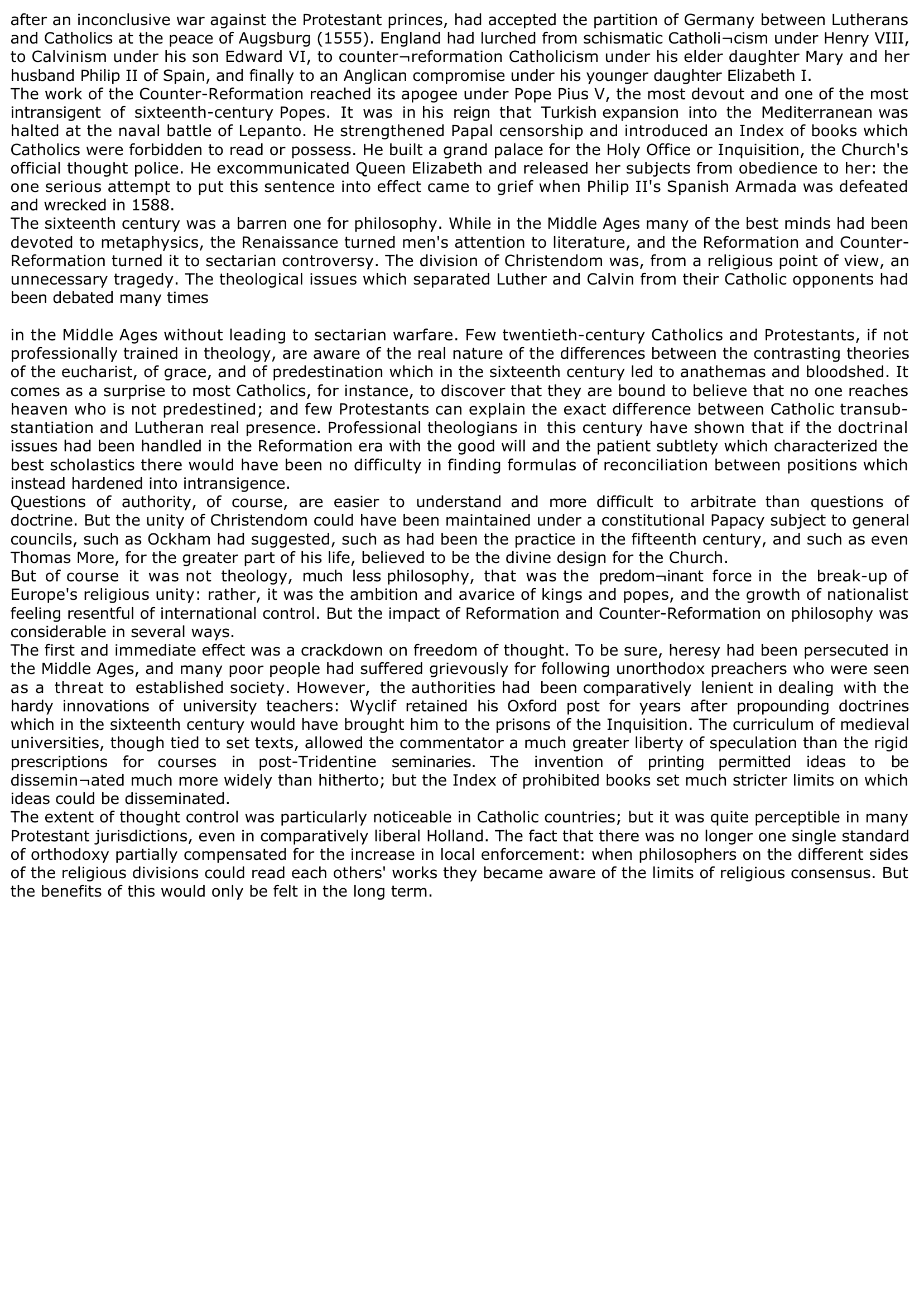Encyclopedia of Philosophy: The Reformation
Publié le 09/01/2010
Extrait du document
The society in which More had grown up was about to be changed dramatically, and in his opinion, greatly for the worse. In 1517 a professor of theology at Wittenberg threw down a challenge to the Pope's pretensions that was to lead half Europe to reject Papal authority. Martin Luther, an Augustinian monk of the monastery of Erfurt, had made a study of St Paul's Epistle to the Romans which led him to question fundamentally the ethos of Renaissance Catholicism. The occasion of his public protest was the proclamation of an indulgence in return for contributions to the building of the great new church of St Peter's in Rome. The offer of an indulgence – that is, of remission of punishment due to sin – was a normal part of Catholic practice; but this particular indulgence was promoted in such an irregular and catchpenny manner as to be a scandal even by the lax standards of the period.
«
after an inconclusive war against the Protestant princes, had accepted the partition of Germany between Lutheransand Catholics at the peace of Augsburg (1555).
England had lurched from schismatic Catholi¬cism under Henry VIII,to Calvinism under his son Edward VI, to counter¬reformation Catholicism under his elder daughter Mary and herhusband Philip II of Spain, and finally to an Anglican compromise under his younger daughter Elizabeth I.The work of the Counter-Reformation reached its apogee under Pope Pius V, the most devout and one of the mostintransigent of sixteenth-century Popes.
It was in his reign that Turkish expansion into the Mediterranean washalted at the naval battle of Lepanto.
He strengthened Papal censorship and introduced an Index of books whichCatholics were forbidden to read or possess.
He built a grand palace for the Holy Office or Inquisition, the Church'sofficial thought police.
He excommunicated Queen Elizabeth and released her subjects from obedience to her: theone serious attempt to put this sentence into effect came to grief when Philip II's Spanish Armada was defeatedand wrecked in 1588.The sixteenth century was a barren one for philosophy.
While in the Middle Ages many of the best minds had beendevoted to metaphysics, the Renaissance turned men's attention to literature, and the Reformation and Counter-Reformation turned it to sectarian controversy.
The division of Christendom was, from a religious point of view, anunnecessary tragedy.
The theological issues which separated Luther and Calvin from their Catholic opponents hadbeen debated many times
in the Middle Ages without leading to sectarian warfare.
Few twentieth-century Catholics and Protestants, if notprofessionally trained in theology, are aware of the real nature of the differences between the contrasting theoriesof the eucharist, of grace, and of predestination which in the sixteenth century led to anathemas and bloodshed.
Itcomes as a surprise to most Catholics, for instance, to discover that they are bound to believe that no one reachesheaven who is not predestined; and few Protestants can explain the exact difference between Catholic transub-stantiation and Lutheran real presence.
Professional theologians in this century have shown that if the doctrinalissues had been handled in the Reformation era with the good will and the patient subtlety which characterized thebest scholastics there would have been no difficulty in finding formulas of reconciliation between positions whichinstead hardened into intransigence.Questions of authority, of course, are easier to understand and more difficult to arbitrate than questions ofdoctrine.
But the unity of Christendom could have been maintained under a constitutional Papacy subject to generalcouncils, such as Ockham had suggested, such as had been the practice in the fifteenth century, and such as evenThomas More, for the greater part of his life, believed to be the divine design for the Church.But of course it was not theology, much less philosophy, that was the predom¬inant force in the break-up ofEurope's religious unity: rather, it was the ambition and avarice of kings and popes, and the growth of nationalistfeeling resentful of international control.
But the impact of Reformation and Counter-Reformation on philosophy wasconsiderable in several ways.The first and immediate effect was a crackdown on freedom of thought.
To be sure, heresy had been persecuted inthe Middle Ages, and many poor people had suffered grievously for following unorthodox preachers who were seenas a threat to established society.
However, the authorities had been comparatively lenient in dealing with thehardy innovations of university teachers: Wyclif retained his Oxford post for years after propounding doctrineswhich in the sixteenth century would have brought him to the prisons of the Inquisition.
The curriculum of medievaluniversities, though tied to set texts, allowed the commentator a much greater liberty of speculation than the rigidprescriptions for courses in post-Tridentine seminaries.
The invention of printing permitted ideas to bedissemin¬ated much more widely than hitherto; but the Index of prohibited books set much stricter limits on whichideas could be disseminated.The extent of thought control was particularly noticeable in Catholic countries; but it was quite perceptible in manyProtestant jurisdictions, even in comparatively liberal Holland.
The fact that there was no longer one single standardof orthodoxy partially compensated for the increase in local enforcement: when philosophers on the different sidesof the religious divisions could read each others' works they became aware of the limits of religious consensus.
Butthe benefits of this would only be felt in the long term..
»
↓↓↓ APERÇU DU DOCUMENT ↓↓↓
Liens utiles
- Encyclopedia of Philosophy: Albert the Great
- Encyclopedia of Philosophy: THE CHARACTER AND ORGANIZATION OF THE SCIENCES - COMTE
- Encyclopedia of Philosophy: THE LAW OF THREE STAGES - COMTE
- Encyclopedia of Philosophy: THE TRANSCENDENTAL DIALECTIC: THE ANTINOMIES OF PURE REASON - KANT
- Encyclopedia of Philosophy: The Philosophes

































